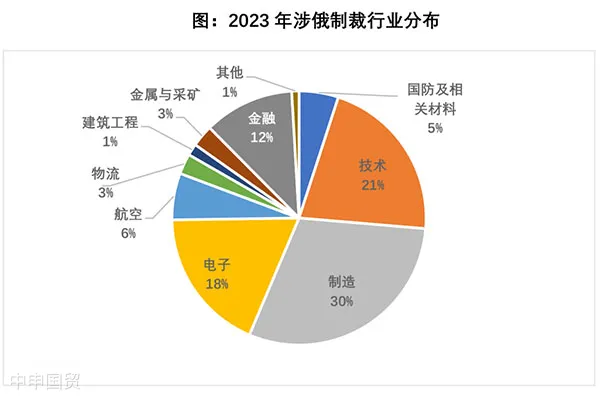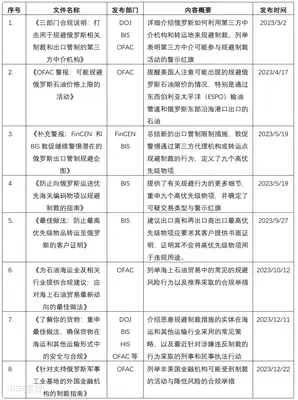- Shanghai Zhongshen International Trade Co., Ltd. - Two decades of trade agency expertise.
- Service Hotline: 139 1787 2118
Against the backdrop of the Russia-Ukraine conflict, how exactly does the United States implement its control and sanction measures against Russian and third - country enterprises? And what far - reaching impacts do these measures have on the global economic and political landscape? In 2023, the United States significantly expanded the scope of its export controls on Russia by further amending the Export Administration Regulations (EAR), and focused its efforts on industries closely related to Russias military and national defense activities. This series of measures not only deepened the economic sanctions against Russia but also posed unprecedented challenges to global trade partnerships.
I. Legislative Trends of US Controls and Sanctions against Russia in 2023
(I) Legislative Trends of Export Controls
In the export control legislation actions of the United States in 2023, the regulatory concept of combining general control and precise targeting was clearly demonstrated. Through two amendments to the EAR, the United States not only significantly expanded the scope of export - controlled items to Russia, including a wide range of items from engines to toasters, but also specifically focused on controlling high - priority items related to Russias military and national defense.
Amendment to the Export Administration Regulations (EAR)
Through two important amendments to the Export Administration Regulations (EAR), the United States significantly expanded the scope of export - controlled items to Russia. These amendments specifically include:
Concentrating Efforts on Targeting “High - Priority Items”
In its export control of Russia, the United States particularly emphasized the key control of “high - priority items”. These items are mainly closely related to Russias military power and national defense activities, including but not limited to:
(II) Legislative Trends of Economic Sanctions
In terms of economic sanctions, the United States further increased the coverage of sanctions against Russia by issuing new executive orders and decisions and expanding the scope of general licenses. In particular, the secondary sanction risks for non - Americans are constantly increasing, indicating the United States comprehensive crackdown on the Russian economy and the sanction pressure on global partners. The continuous expansion of the industry sanction map, especially the increase in secondary sanction risks in the financial industry, has brought greater uncertainty to the global financial market.

II. Law Enforcement Observations of US Controls and Sanctions against Russia in 2023
(I) Increased Activity in Industry Sanction Law Enforcement
In 2023, based on the sanctions regulations against Russia, the United States included a large number of entities closely related to Russias military and national defense activities in the SDN list, especially in the industrial manufacturing, electronics, technology, finance, national defense, and aviation industries. According to statistics, the sanctioned third - country entities are mainly distributed in Cyprus, the UAE, Turkey, China (including Hong Kong), Singapore, Sweden, the UK, etc. For third - country entities other than Russia, US law enforcement departments pay more attention to the situation where they transship controlled items to Russia, enabling Russian entities to evade control. Judging from the cases, third - country entities operating in the technology and electronics industries are most likely to be sanctioned by the United States; in addition, third - country entities operating in the aviation and financial services industries also have relatively high sanction risks.

(II) Establishment of the “Disruptive Technology Strike Team” and Enhanced Law Enforcement Linkage
The US OFAC has increased its interaction frequency with other law enforcement agencies. The establishment of the “Disruptive Technology Action Team” shows the United States determination to combat Russias access to advanced technologies. The enhanced cross - departmental law enforcement linkage provides a more powerful guarantee for preventing the illegal acquisition and use of US advanced technologies, especially preventing the flow of technologies to Russia.
(III) Frequent Issuance of Guidance Documents to Intensify the Crackdown on Sanction - Evasion Behavior
US regulatory agencies have significantly increased their crackdown on sanction - evasion behavior. By frequently issuing guidance documents, they have sent a strong anti - evasion law enforcement signal to the global market. This indicates that the United States will continue to increase sanctions against Russia and third - country enterprises that assist Russia in evading sanctions, and strengthen the supervision and crackdown on sanction - evasion activities.

Overall, the control and sanction measures of the United States against Russia in 2023 undoubtedly exacerbated the global political and economic tensions, had a profound impact on international trade and financial markets, and the intensity of sanctions and law enforcement was second only to countries under comprehensive sanctions such as Iran and Syria. 2024 will be the year of the US presidential election, and whether the US attitude towards sanctions against Russia may change remains to be further observed. For Chinese enterprises, as European and American enterprises have withdrawn from the Russian market under the background of sanctions, there are both opportunities and challenges in Russian business.
Related Recommendations
? 2025. All Rights Reserved. 滬ICP備2023007705號(hào)-2  PSB Record: Shanghai No.31011502009912
PSB Record: Shanghai No.31011502009912









